
Jun 11, 2015 | Focolare Worldwide
 Thousands of signatures within a few short days under the title: Unity is strength. In April 2015, the Italian National Olymic Committee (CONI) launched a project for teenagers and young Italian residents of disadvantaged areas, titled: Vinvcere da grandi, meaning, becoming a winner as an adult. The news that was given with such large covereage has left a positive impression in many. The situation, which is paradoxical and painful, has created a tear in the social fabric that must be mended. Ths Focolare Movement in italy has noticed, along with many other associations in the country that fight for legality, transparency, and social justice. Universal brotherhood is also built in this way: joining together to ask the Italian National Olympic Committee to discontinue its collaboration with Lottomatica. The Focolare Movement in Italy has launched an online petition asking the Italian Government and Parliament to intervene in supporting an authentic culture of sport in the country, and a concrete commitment to the growth of young people. It is a bet that will only be paid off later, and we are conscious of the disproportion between the forces (like David and Goliath), but we are equally convinced that it is important to give a signal that goes against the trend. If you are interested in the project Stop Progetto Coni Lottomatica “Vincere da Grandi”, go to the New Humanity website.
Thousands of signatures within a few short days under the title: Unity is strength. In April 2015, the Italian National Olymic Committee (CONI) launched a project for teenagers and young Italian residents of disadvantaged areas, titled: Vinvcere da grandi, meaning, becoming a winner as an adult. The news that was given with such large covereage has left a positive impression in many. The situation, which is paradoxical and painful, has created a tear in the social fabric that must be mended. Ths Focolare Movement in italy has noticed, along with many other associations in the country that fight for legality, transparency, and social justice. Universal brotherhood is also built in this way: joining together to ask the Italian National Olympic Committee to discontinue its collaboration with Lottomatica. The Focolare Movement in Italy has launched an online petition asking the Italian Government and Parliament to intervene in supporting an authentic culture of sport in the country, and a concrete commitment to the growth of young people. It is a bet that will only be paid off later, and we are conscious of the disproportion between the forces (like David and Goliath), but we are equally convinced that it is important to give a signal that goes against the trend. If you are interested in the project Stop Progetto Coni Lottomatica “Vincere da Grandi”, go to the New Humanity website.
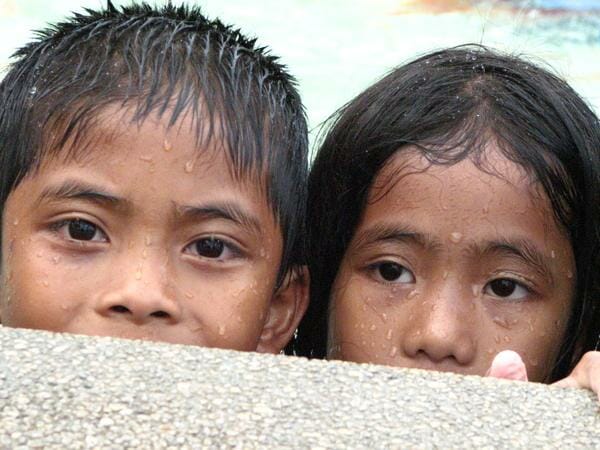
Jun 10, 2015 | Focolare Worldwide
 “Last year a two year old girl who is quite dear to me almost lost her life. I thought that because she had been born here, she was immediately given every medical cure and surgery. But what if she had been born in a country with less resources, how would it have gone for her? And why should she have had the good fortune of living here? Do other children not have the same right?” Thus Gabriella got to work organising a fundraising project for disadvantaged children, asking the Mayor for a public space on the main square of her town, Marcignago di Pavia, Italy. She also involved the Parish, the Diocese and the local press. “How will it turn out, I dont’know,” she admits, “I know why and for whom I’m doing this, and the only thing I can do is hope for the best!” This is but one of the many testimonies of supporters who have become involved in the #obiettivo15mila campaign of the New Families Association begun on May 24 in Rome, Italy, at the Città dell’Altra Economia. “The goal” – Association president Andrea Turatti explains – is to “give visibility to what we are already doing through on-going projects in 50 countries, and to expand our involvement, by involving others in projects of solidarity.” Solidarity projects have multiplied in many Italian cities and in several social projects that are underway around the world. With internet link-ups they have been able to present their activities: surgical clinics, nursery schools, primary schools and after-school programmes, through which children and teens receive adequate nourishment and medical care, scholastic assistance and other professional services. These programmes are inserted in wider interventions, in cooperation with national and international partnerships in favor of families and entire communities until they are able to be autonomous, and in favour of the well-being of children worldwide. “We would also like to contribute to the solidarity,” said Youn Vera who, thanks to the distance support is now attending the second year of secondary school at the Collegio Gue Pascal of Man, on the Ivory Coast. “To help out four classmates who were ill and in need of medical care, we had the idea of a garden where we could grow salad and spinach.” “Distance support is a project that does much direct good for us, not only to the ones who receive, but because it makes you grow, it puts you in contact with different people and cultures, it helps you to discover the value of sobriety and creates community,” said Vincenzo Curatolo, president of the Sad Forum which joins hundreds of associations in Italy. One example is Guido and Azzurra who together with other teenagers from the Roman quarter, tell how they have founded an association that has been operating for nearly two years, in which they carry out several activities in favour of others. The most beautiful experience has been in the Philippines, responding to the emergency in the aftermath of hurricane Hayan. Hosted by the Focolare and in cooperation with the New Families non-Profit Association they went into several barrios on the peripheries of several cities and touched with their own hands what previously had seen so distant from their daily lives and could only be seen on television. Living them out in daily life, really changed our way of thinking. Then we wanted to make a long-term commitment in supporting a girl in a wheelchair: Princess, with her sunshine smile.” Giusy, from near Pisa, Italy, tells of how one group of Focolare New Families slowly got the whole area involved, the municipal council and some 300 families. “The project was begun by me and my colleague, twenty years ago,” says Massimo Grossi of the RCS Corriere della Sera, and it has involved more than 250 journalists and printing services. Thanks to many small donations, we received 50 distance supporters for children in Africa and Asia; many small contributions that united together: this is our spirit and our strength.”
“Last year a two year old girl who is quite dear to me almost lost her life. I thought that because she had been born here, she was immediately given every medical cure and surgery. But what if she had been born in a country with less resources, how would it have gone for her? And why should she have had the good fortune of living here? Do other children not have the same right?” Thus Gabriella got to work organising a fundraising project for disadvantaged children, asking the Mayor for a public space on the main square of her town, Marcignago di Pavia, Italy. She also involved the Parish, the Diocese and the local press. “How will it turn out, I dont’know,” she admits, “I know why and for whom I’m doing this, and the only thing I can do is hope for the best!” This is but one of the many testimonies of supporters who have become involved in the #obiettivo15mila campaign of the New Families Association begun on May 24 in Rome, Italy, at the Città dell’Altra Economia. “The goal” – Association president Andrea Turatti explains – is to “give visibility to what we are already doing through on-going projects in 50 countries, and to expand our involvement, by involving others in projects of solidarity.” Solidarity projects have multiplied in many Italian cities and in several social projects that are underway around the world. With internet link-ups they have been able to present their activities: surgical clinics, nursery schools, primary schools and after-school programmes, through which children and teens receive adequate nourishment and medical care, scholastic assistance and other professional services. These programmes are inserted in wider interventions, in cooperation with national and international partnerships in favor of families and entire communities until they are able to be autonomous, and in favour of the well-being of children worldwide. “We would also like to contribute to the solidarity,” said Youn Vera who, thanks to the distance support is now attending the second year of secondary school at the Collegio Gue Pascal of Man, on the Ivory Coast. “To help out four classmates who were ill and in need of medical care, we had the idea of a garden where we could grow salad and spinach.” “Distance support is a project that does much direct good for us, not only to the ones who receive, but because it makes you grow, it puts you in contact with different people and cultures, it helps you to discover the value of sobriety and creates community,” said Vincenzo Curatolo, president of the Sad Forum which joins hundreds of associations in Italy. One example is Guido and Azzurra who together with other teenagers from the Roman quarter, tell how they have founded an association that has been operating for nearly two years, in which they carry out several activities in favour of others. The most beautiful experience has been in the Philippines, responding to the emergency in the aftermath of hurricane Hayan. Hosted by the Focolare and in cooperation with the New Families non-Profit Association they went into several barrios on the peripheries of several cities and touched with their own hands what previously had seen so distant from their daily lives and could only be seen on television. Living them out in daily life, really changed our way of thinking. Then we wanted to make a long-term commitment in supporting a girl in a wheelchair: Princess, with her sunshine smile.” Giusy, from near Pisa, Italy, tells of how one group of Focolare New Families slowly got the whole area involved, the municipal council and some 300 families. “The project was begun by me and my colleague, twenty years ago,” says Massimo Grossi of the RCS Corriere della Sera, and it has involved more than 250 journalists and printing services. Thanks to many small donations, we received 50 distance supporters for children in Africa and Asia; many small contributions that united together: this is our spirit and our strength.”
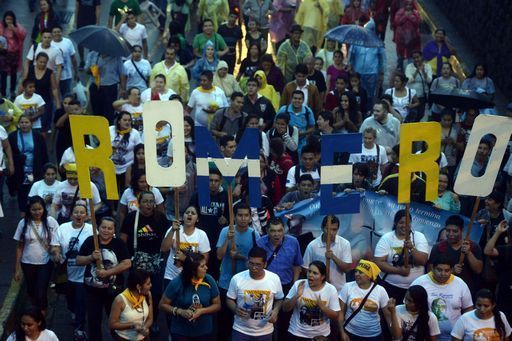
Jun 6, 2015 | Focolare Worldwide
 “The last time we ever saw anything like this was when Pope John Paul II visited in 1983,” writes Filippo Casabianca, from El Salvador. It is a land with a population of 6 million people in an area of 21 thousand km2 that had amongst its sons this bishop who is widely recognized as one of the most important ecclesial figures of the American continent. The Cause had been opened by Bishop Rivera y Damas, his successor as shepherd of the Diocese, on the tenth anniversary of his death on March 24, 1980. That was the year Marita Sartori and Carlo Casabeltrame visited three Franciscan friars who had begun to spread the ideal of unity in El Salvador. In that tragic decade, which opened with the murder of Archbishop Romero and culminated with the murder of 7 Jesuits, their housekeeper and her daughter, the Focolare Movement spread in an extraordinary way in several points of the country, in the midst of a theatre of war. The women’s focolare was opened in 1989 in spite of the danger for the foreign focolarine who went to live there. Since then the country has been through a process that led to the signing of a peace treaty in 1992, and then to a more democratic form of governement with some political stability, but not the long desired reconciliation that today is expressed in a destructive polorization. To this is added the scourge of insecurity because of the proliferation of young criminal gangs and of large segments of the country. The Focolare community are involved in many projects in support of disadvantaged families, through programmes of the New Families Project and the Action for a United World, that have allowed hundreds of children to complete their education supported by the projects of educational centres for poor children, and through interventions in one at-risk quarter for the promotion of social integration. With Romero’s Beatification the awareness of an historic opportunity has grown amongst the people. His message is being preceived as a medicine that could contribute to overcoming opposing views, healing hearts that have been hardened by resentment, and provide what is most necessary in the process of reconciliation. Maribel remarks: “It is a challenge that begins with following the example of Archbishop Romero, which for me continues to help me and my students to nurture peace and justice in people’s hearts .” Whereas, for Amaris: “the celebration will have to give way to reconciliation that lies in forgiving and asking to be forgiven, to heal wounds that are still festering.” Commitment to unity and reconciliation have always been present in the Focolare community, but now they take on the new connotation of a mandate in light of the heroic witness of Archbishop Romero “who knew how to weep with those who weep,” Flora Blandon observed, “and rejoice with those who had a reason to rejoice. The Beatification is the recognition of his life that was anchored in love.” In the messages sent by Pope Francis to the current Archbishop of El Salvador, Josè Luis Escobar Alas, the Pope calls Romero “one of the best sons of the Church,” attributing him with the characteristics of the Good Shepherd who was so dear to him. “Because (God) had bestowed upon the bishop martyr the capacity to see and listen to the suffering of his people and to shape his heart that, in his name, he might guide and illumine.” Francis also also recognised his exemplarity and invited all to encounter in the figure of Romero “strength and courage for building the Kingdom of God and being involved in the search for a more dignified and equal social order.”
“The last time we ever saw anything like this was when Pope John Paul II visited in 1983,” writes Filippo Casabianca, from El Salvador. It is a land with a population of 6 million people in an area of 21 thousand km2 that had amongst its sons this bishop who is widely recognized as one of the most important ecclesial figures of the American continent. The Cause had been opened by Bishop Rivera y Damas, his successor as shepherd of the Diocese, on the tenth anniversary of his death on March 24, 1980. That was the year Marita Sartori and Carlo Casabeltrame visited three Franciscan friars who had begun to spread the ideal of unity in El Salvador. In that tragic decade, which opened with the murder of Archbishop Romero and culminated with the murder of 7 Jesuits, their housekeeper and her daughter, the Focolare Movement spread in an extraordinary way in several points of the country, in the midst of a theatre of war. The women’s focolare was opened in 1989 in spite of the danger for the foreign focolarine who went to live there. Since then the country has been through a process that led to the signing of a peace treaty in 1992, and then to a more democratic form of governement with some political stability, but not the long desired reconciliation that today is expressed in a destructive polorization. To this is added the scourge of insecurity because of the proliferation of young criminal gangs and of large segments of the country. The Focolare community are involved in many projects in support of disadvantaged families, through programmes of the New Families Project and the Action for a United World, that have allowed hundreds of children to complete their education supported by the projects of educational centres for poor children, and through interventions in one at-risk quarter for the promotion of social integration. With Romero’s Beatification the awareness of an historic opportunity has grown amongst the people. His message is being preceived as a medicine that could contribute to overcoming opposing views, healing hearts that have been hardened by resentment, and provide what is most necessary in the process of reconciliation. Maribel remarks: “It is a challenge that begins with following the example of Archbishop Romero, which for me continues to help me and my students to nurture peace and justice in people’s hearts .” Whereas, for Amaris: “the celebration will have to give way to reconciliation that lies in forgiving and asking to be forgiven, to heal wounds that are still festering.” Commitment to unity and reconciliation have always been present in the Focolare community, but now they take on the new connotation of a mandate in light of the heroic witness of Archbishop Romero “who knew how to weep with those who weep,” Flora Blandon observed, “and rejoice with those who had a reason to rejoice. The Beatification is the recognition of his life that was anchored in love.” In the messages sent by Pope Francis to the current Archbishop of El Salvador, Josè Luis Escobar Alas, the Pope calls Romero “one of the best sons of the Church,” attributing him with the characteristics of the Good Shepherd who was so dear to him. “Because (God) had bestowed upon the bishop martyr the capacity to see and listen to the suffering of his people and to shape his heart that, in his name, he might guide and illumine.” Francis also also recognised his exemplarity and invited all to encounter in the figure of Romero “strength and courage for building the Kingdom of God and being involved in the search for a more dignified and equal social order.”
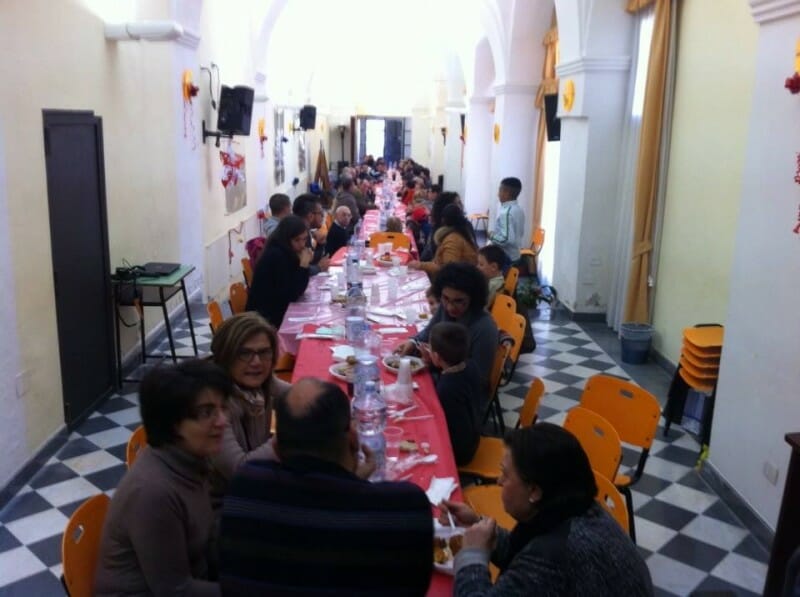
Jun 5, 2015 | Focolare Worldwide
 “Last September,” says Luigi, trade unionist, who seeks to live the spirituality of unity along with Fr. Peppino and others in the parish, “we had the idea to organize meals for solidarity for those on the margins of society, for the lonely.” The place to do it? “We realized that with a little work the space we use for parish meetings could become a welcoming dining room. It wasn’t even difficult to make the guest list. Their faces are familiar to us: people we see on the street, who live in the same neighbourhoods where we live, who are our next door neighbours, those who are helped by the Caritas, the elderly, foreigners…” “We started by dividing up the tasks to be done,” interjects Grace. “One offered to do the shopping, notifying restaurants and supermarkets; one offered to cook, with close attention to preparing dishes that even our Muslim friends could eat. The strongest offered to fix up the room and the teen girls offered to prepare the entertainment. A well-rounded team: young people, adults, and even children.” The first lunch was held in October 2014. For everyone involved it was a sunny Sunday, as was the radiant face of the elderly man with the cane and the woman who loved to dance and enjoyed herself so much. A few days before Christmas, the second lunch was held. “You can’t imagine the joy of the anticipation,” remembers Vincent, “when the hall was opened there were already a few elderly participants sitting on a bench waiting. As soon as they saw us they came to embrace us and give us the season’s greetings, and then went to find a place to sit. Immediately after wards all the others arrived, including the children and their parents. Between courses there was music and karaoke, and then the Moroccan girls instructed everyone in dances to songs from their country.” The children, meanwhile, played, coloured, and tried to wait patiently for the big surprise…the arrival of Santa Claus, who distributed gifts for everyone. “For us, the organizers, there were no wrapped presents,” says Carla, “but we received a much more precious gift: the scene of all those people, finally smiling and happy.” After the Christmas lunch followed that of Epiphany, and still many others: a tradition which continues, and each time becomes a chance to intertwine oneself in many cultures and religions. Among the guests, who gradually become more and more numerous, there are Arabians, Ukrainians, Catholics, Orthodox, Evangelicals, people of no religious conviction and especially many Muslims. “Is there difficulty? Commitment? Problems? Of course,” admits Luigi, “because it isn’t easy to organize meals like these from nothing. But the joy that moments like these bring us is indescribable, leaving in each of us the desire and the inventiveness to do more. They are truly opportunities to grow as a person and to grow in the sense of community, in us organizers and in the guests, who are no longer guests but truly brothers and sisters.”
“Last September,” says Luigi, trade unionist, who seeks to live the spirituality of unity along with Fr. Peppino and others in the parish, “we had the idea to organize meals for solidarity for those on the margins of society, for the lonely.” The place to do it? “We realized that with a little work the space we use for parish meetings could become a welcoming dining room. It wasn’t even difficult to make the guest list. Their faces are familiar to us: people we see on the street, who live in the same neighbourhoods where we live, who are our next door neighbours, those who are helped by the Caritas, the elderly, foreigners…” “We started by dividing up the tasks to be done,” interjects Grace. “One offered to do the shopping, notifying restaurants and supermarkets; one offered to cook, with close attention to preparing dishes that even our Muslim friends could eat. The strongest offered to fix up the room and the teen girls offered to prepare the entertainment. A well-rounded team: young people, adults, and even children.” The first lunch was held in October 2014. For everyone involved it was a sunny Sunday, as was the radiant face of the elderly man with the cane and the woman who loved to dance and enjoyed herself so much. A few days before Christmas, the second lunch was held. “You can’t imagine the joy of the anticipation,” remembers Vincent, “when the hall was opened there were already a few elderly participants sitting on a bench waiting. As soon as they saw us they came to embrace us and give us the season’s greetings, and then went to find a place to sit. Immediately after wards all the others arrived, including the children and their parents. Between courses there was music and karaoke, and then the Moroccan girls instructed everyone in dances to songs from their country.” The children, meanwhile, played, coloured, and tried to wait patiently for the big surprise…the arrival of Santa Claus, who distributed gifts for everyone. “For us, the organizers, there were no wrapped presents,” says Carla, “but we received a much more precious gift: the scene of all those people, finally smiling and happy.” After the Christmas lunch followed that of Epiphany, and still many others: a tradition which continues, and each time becomes a chance to intertwine oneself in many cultures and religions. Among the guests, who gradually become more and more numerous, there are Arabians, Ukrainians, Catholics, Orthodox, Evangelicals, people of no religious conviction and especially many Muslims. “Is there difficulty? Commitment? Problems? Of course,” admits Luigi, “because it isn’t easy to organize meals like these from nothing. But the joy that moments like these bring us is indescribable, leaving in each of us the desire and the inventiveness to do more. They are truly opportunities to grow as a person and to grow in the sense of community, in us organizers and in the guests, who are no longer guests but truly brothers and sisters.”
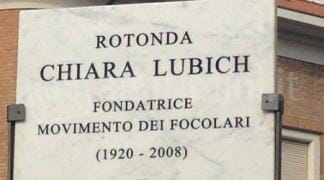
Jun 4, 2015 | Focolare Worldwide
 In a ceremony held on Saturday May 30th, a traffic circle was dedicated to Chiara Lubich, foundress of the Focolare Movement and honorary citizen of Rimini, between Savonarola Street, Giacomo Matteotti Boulevard, and Mille Street, overlooking the University complex “Navigare Necesse.” “A moment of attention for an important figure connected to our city,” said Irina Imola, the assessor to the General Services of the municipality of Rimini, who opened the ceremony. “For this, I thank all the authorities present and the many who have drawn teaching and comfort from the work of Chiara Lubich.” In 1997 the Municipality of Rimini had conferred upon Chiara Lubich honorary citizenship, “for her work of construction,” among the motivations expressed by the City Council, “of a civilization of love, tolerance, and solidarity among peoples.” Source: Altarimini online
In a ceremony held on Saturday May 30th, a traffic circle was dedicated to Chiara Lubich, foundress of the Focolare Movement and honorary citizen of Rimini, between Savonarola Street, Giacomo Matteotti Boulevard, and Mille Street, overlooking the University complex “Navigare Necesse.” “A moment of attention for an important figure connected to our city,” said Irina Imola, the assessor to the General Services of the municipality of Rimini, who opened the ceremony. “For this, I thank all the authorities present and the many who have drawn teaching and comfort from the work of Chiara Lubich.” In 1997 the Municipality of Rimini had conferred upon Chiara Lubich honorary citizenship, “for her work of construction,” among the motivations expressed by the City Council, “of a civilization of love, tolerance, and solidarity among peoples.” Source: Altarimini online
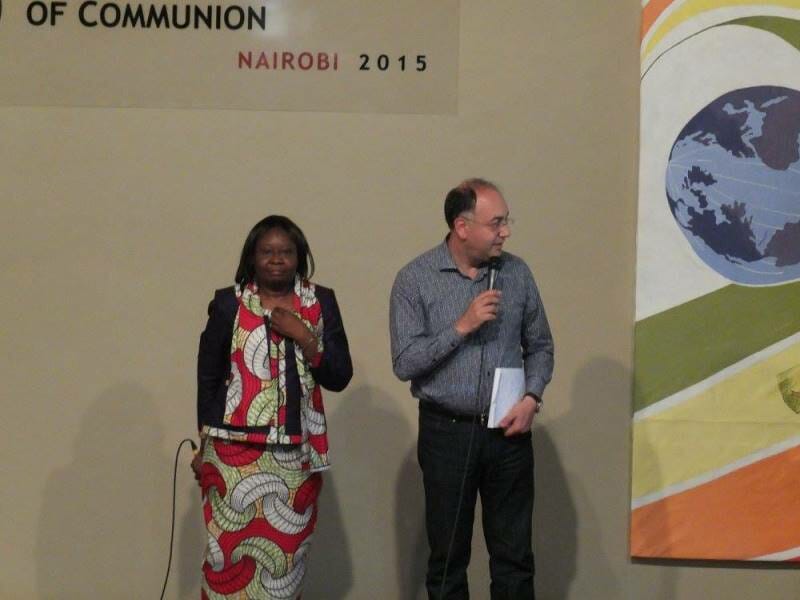
Jun 3, 2015 | Focolare Worldwide
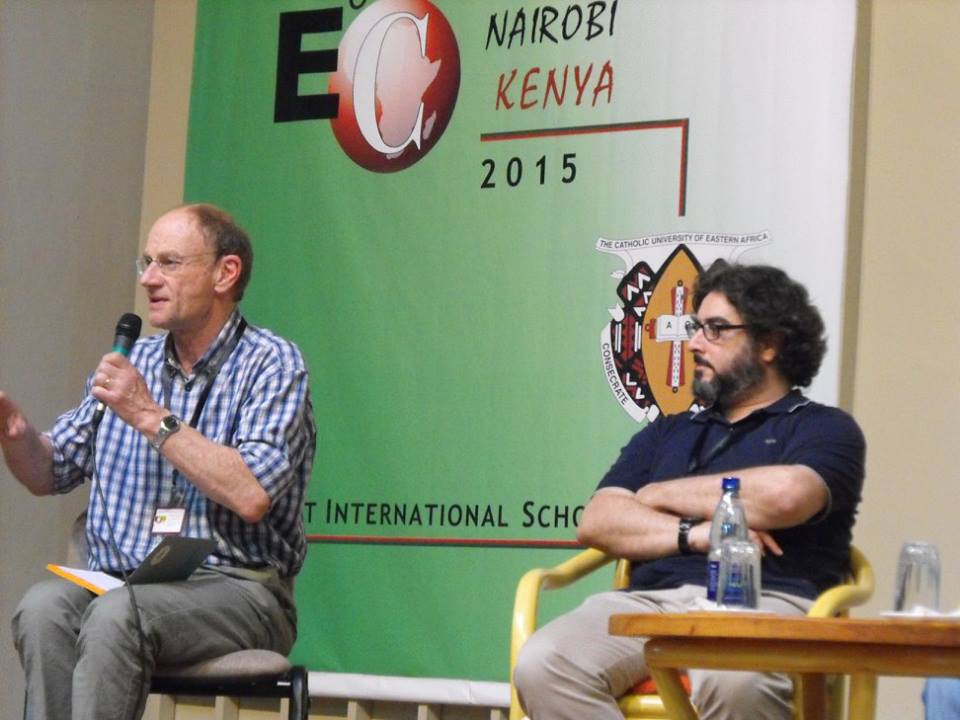 In order to look toward the future, on the last day of the meeting, the Congress turned its gaze on the new generations. With the first engaging words of Anouk Grevin, Professor of Management at the University of Nantes and member of the International Commission of the EoC, everyone broke into applause: “When a baby is born,” he said, “the whole community shows care, the child that was born belongs to everyone.” His words express one of the most important values of the African continent and that is,”You need a village to grow a child”. Grevin went on to say, “We lived such wonderful dreams with the young people at the International EoC School!” With much enthusiasm Anouk moved around the hall. The walls were covered with pictures of the young people’s projects, and their dreams. With unique creativity and a passion that would be difficult to describe, the young people presented those projects: some already underway, others only dreams, although for them that didn’t matter! John Mundell launched an appeal to his friends: open your businesses to introduce these new generations into the work world: “The experience in an EoC business makes you experience a wealth of true relationships along with professionalism!”
In order to look toward the future, on the last day of the meeting, the Congress turned its gaze on the new generations. With the first engaging words of Anouk Grevin, Professor of Management at the University of Nantes and member of the International Commission of the EoC, everyone broke into applause: “When a baby is born,” he said, “the whole community shows care, the child that was born belongs to everyone.” His words express one of the most important values of the African continent and that is,”You need a village to grow a child”. Grevin went on to say, “We lived such wonderful dreams with the young people at the International EoC School!” With much enthusiasm Anouk moved around the hall. The walls were covered with pictures of the young people’s projects, and their dreams. With unique creativity and a passion that would be difficult to describe, the young people presented those projects: some already underway, others only dreams, although for them that didn’t matter! John Mundell launched an appeal to his friends: open your businesses to introduce these new generations into the work world: “The experience in an EoC business makes you experience a wealth of true relationships along with professionalism!” 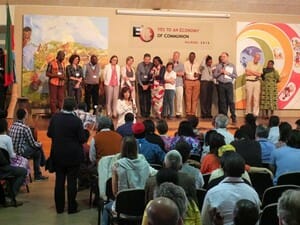 The real life events of the business people from around the world – especially the young people – gave glimpses of a better future: from Italy to Argentina, to Paraguay, to the presentation of a thesis on the EoC by a young Brazilian woman who is about to finish her studies at Sophia Institute. If today our gaze is pointed towards the future-present, then it is an important moment for making strong and binding commitments: “We should promise ourselves that we will never turn back,” said Luigino Bruni. “ We’ve lived some miracles over the past few days, our stories that need to be told to everyone. The EoC isn’t a consumer good, many people in the world waiting for it. We need to continue to be “producers” of communion, not only its consumers.” The final statement was a powerful appeal. The promise to give one’s life for an economy of communion. Then the business people wished to leave a visible sign of their personal commitment, which materialised in the form of a “pact,” which everyone was free to sign.
The real life events of the business people from around the world – especially the young people – gave glimpses of a better future: from Italy to Argentina, to Paraguay, to the presentation of a thesis on the EoC by a young Brazilian woman who is about to finish her studies at Sophia Institute. If today our gaze is pointed towards the future-present, then it is an important moment for making strong and binding commitments: “We should promise ourselves that we will never turn back,” said Luigino Bruni. “ We’ve lived some miracles over the past few days, our stories that need to be told to everyone. The EoC isn’t a consumer good, many people in the world waiting for it. We need to continue to be “producers” of communion, not only its consumers.” The final statement was a powerful appeal. The promise to give one’s life for an economy of communion. Then the business people wished to leave a visible sign of their personal commitment, which materialised in the form of a “pact,” which everyone was free to sign.

Genéviève Sanzé and Luigino Bruni addressing the conference

 Thousands of signatures within a few short days under the title: Unity is strength. In April 2015, the Italian National Olymic Committee (CONI) launched a project for teenagers and young Italian residents of disadvantaged areas, titled: Vinvcere da grandi, meaning, becoming a winner as an adult. The news that was given with such large covereage has left a positive impression in many. The situation, which is paradoxical and painful, has created a tear in the social fabric that must be mended. Ths Focolare Movement in italy has noticed, along with many other associations in the country that fight for legality, transparency, and social justice. Universal brotherhood is also built in this way: joining together to ask the Italian National Olympic Committee to discontinue its collaboration with Lottomatica. The Focolare Movement in Italy has launched an online petition asking the Italian Government and Parliament to intervene in supporting an authentic culture of sport in the country, and a concrete commitment to the growth of young people. It is a bet that will only be paid off later, and we are conscious of the disproportion between the forces (like David and Goliath), but we are equally convinced that it is important to give a signal that goes against the trend. If you are interested in the project Stop Progetto Coni Lottomatica “Vincere da Grandi”, go to the New Humanity website.
Thousands of signatures within a few short days under the title: Unity is strength. In April 2015, the Italian National Olymic Committee (CONI) launched a project for teenagers and young Italian residents of disadvantaged areas, titled: Vinvcere da grandi, meaning, becoming a winner as an adult. The news that was given with such large covereage has left a positive impression in many. The situation, which is paradoxical and painful, has created a tear in the social fabric that must be mended. Ths Focolare Movement in italy has noticed, along with many other associations in the country that fight for legality, transparency, and social justice. Universal brotherhood is also built in this way: joining together to ask the Italian National Olympic Committee to discontinue its collaboration with Lottomatica. The Focolare Movement in Italy has launched an online petition asking the Italian Government and Parliament to intervene in supporting an authentic culture of sport in the country, and a concrete commitment to the growth of young people. It is a bet that will only be paid off later, and we are conscious of the disproportion between the forces (like David and Goliath), but we are equally convinced that it is important to give a signal that goes against the trend. If you are interested in the project Stop Progetto Coni Lottomatica “Vincere da Grandi”, go to the New Humanity website.






